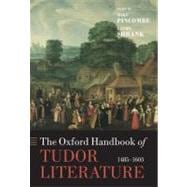
Note: Supplemental materials are not guaranteed with Rental or Used book purchases.
Purchase Benefits
What is included with this book?
| Acknowledgements | |
| Conventions and list of abbreviations | |
| List of illustrations | |
| Notes on contributors | |
| Prologue: The travails of Tudor Literature, Mike Pincombe and Cathy Shrank | |
| 1485-1529 | |
| Caxton and the invention of printing | |
| Dramatic theory and Lucres' 'discretion': the plays of Henry Medwall | |
| Stephen Hawes and courtly education | |
| Having the last word: manuscript, print, and the envoy in the poetry of John Skelton | |
| All for love: Lord Berners and the enduring, evolving romance | |
| 1530-1559 | |
| Thomas More, William Tyndale, and the printing of religious propaganda | |
| Rhetoric, conscience and the playful positions of Sir Thomas More | |
| John Bale and controversy: readers and audiences | |
| Sir Thomas Elyot and the bonds of community | |
| John Heywood and court drama | |
| Thomas Wyatt and Francis Bryan: plainness and dissimulation | |
| Piety and poetry: English psalms from Miles Coverdale to Mary Sidney | |
| Katherine Parr and her circle | |
| John Leland and his heirs: the topography of England | |
| Biblical allusion and argument in Luke Shepherd's verse satires | |
| Reforming the reformers: Robert Crowley and Nicholas Udall | |
| William Baldwin and the Tudor imagination | |
| Directions for English: Thomas Wilson's Art of Rhetoric, George Puttenham's Art of English Poesy, and the Search for Vernacular Eloquence | |
| Order and Disorder: John Proctor's History of Wyatt's Rebellion (1554) | |
| Marian political allegory: John Heywood's The Spider and the Fly | |
| Hall's chronicle and A Mirror for Magistrates: history and the tragic pattern | |
| A place in the shade: George Cavendish and de casibus tragedy | |
| What is my nation?: language, verse and politics in Tudor translations of Virgil's Aeneid | |
| Thomas Hoby, William Thomas and mid-Tudor travel to Italy | |
| Popularizing courtly poetry: Tottel's 'Miscellany' and its progeny | |
| 1560-1579 | |
| Minerva's men: horizontal nationhood and the literary production of Googe, Turberville, and Gascoigne | |
| 'For This is True or Els I do Lye': Thomas Smith, William Bullein and Mid-Tudor Dialogue | |
| English Seneca: Heywood to Hamlet | |
| Political tragedy in the 1560s: Cambises and Gorboduc | |
| John Foxe's Acts and Monuments, 1563-1583: antiquity and the affect of history | |
| Tragical histories, tragical tales | |
| Foresters, ploughmen and shepherds: versions of Tudor pastoral | |
| Interludes, economics and the Elizabethan stage | |
| Ovidian reflections in Gascoigne's Steel Glass | |
| The art of war: martial poetics from Henry Howard to Philip Sidney | |
| Thomas Whythorne and first-person life-writing in the sixteenth century | |
| Pageants and Propaganda: Robert Langham's Letter and George Gascoigne's Princely Pleasures at Kenilworth | |
| Sir Philip Sidney and the Arcadias | |
| 1580-1603 | |
| Gabriel Harvey's choleric writing | |
| The intimacy of manuscript and the pleasure of print: literary culture from The Schoolmaster to Euphues | |
| Robert Greene's Pandosto and George Pettie's Palace of Pleasure | |
| Christopher Marlowe's Doctor Faustus and Nathaniel Woodes's The Conflict of Conscience | |
| Fictive Acts: Thomas Nashe and the mid-Tudor legacy | |
| 'Hear my tale or kiss my tail!': The Old Wife's Tale, Gammer Gurton's Needle and the popular cultures of Tudor comedy | |
| Epilogue: Edmund Spenser and the passing of Tudor literature | |
| Bibliography | |
| Index | |
| Table of Contents provided by Publisher. All Rights Reserved. |
The New copy of this book will include any supplemental materials advertised. Please check the title of the book to determine if it should include any access cards, study guides, lab manuals, CDs, etc.
The Used, Rental and eBook copies of this book are not guaranteed to include any supplemental materials. Typically, only the book itself is included. This is true even if the title states it includes any access cards, study guides, lab manuals, CDs, etc.